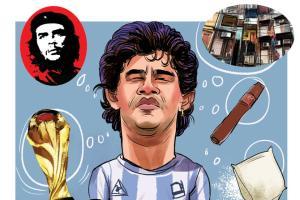In a social media age, that Hand of God moment would have been picked up by a million cameras, the goal would have been disallowed, maybe hed have been handed a red card, but this was the mid 80s

Illustration/Uday Mohite
 There's an odd acronym on social media—G.O.A.T. This has nothing to do with the animal, but spells Greatest Of All Time. Netizens use it to describe their favourite sportsmen, be it Federer or Nadal, Virat or Steve Smith.
There's an odd acronym on social media—G.O.A.T. This has nothing to do with the animal, but spells Greatest Of All Time. Netizens use it to describe their favourite sportsmen, be it Federer or Nadal, Virat or Steve Smith.
ADVERTISEMENT
Millennials believing that football began somewhere in the 2000s, debate the GOAT is either Leo Messi or Cristiano Ronaldo, the legends of the '70s and '80s totally forgotten. That's why I was amazed at the intense mourning when Deigo Maradona was laid to rest, because he played at a time, when The Beautiful Game wasn't as popular in India. In the Pelé vs Maradona GOAT contest, the Brazilian's critics seem to suggest, he always had a fabulous team around him, which diminishes his greatness, whereas if you take Maradona out of the equation, the Argentinian team would be reduced to nothingness.
Perhaps it was that 1986 FIFA World Cup that will remain etched in the minds of a generation; it was the tournament that made him truly immortal. An ordinary Argentinian team, led by Deigo Maradona pulling his team up by their striped blue and white collars and singlehandedly winning them the cup. For one month, May 31-June 30 1986, we'd wake up at unearthly hours, Mexico time, to watch one man weave his magic vs South Korea, Italy, Bulgaria, Belgium, England and West Germany.
For sheer drama, he was the John McEnroe of football—a mad flawed genius, throw in some chest-thumping, some skilful cheating, a cocaine habit, a childhood spent as a street urchin in the suburbs of Buenos Aires, a career where varied oppositions unable to defeat him on the field, chose foul means to bring him down, then throw in some painful cortisone injections and you have El Pibe de Oro (The Golden Kid). This was also the World Cup, where Maradona carried the hunger to defeat the English, by hook or crook, as a vengeance for the Falklands war—a stand out quarter final game, which had a hand goal, followed by another that was heaven sent, one that would haunt the Brits forever and send the midfielder into the annals of folklore.
In a social media age, that 'Hand of God' moment would have been picked up by a million cameras, the goal would have been disallowed, maybe he'd have been handed a red card, but this was the mid '80s.
In that second half, Deigo Maradona even in deceit, had the presence of mind and the sleight of hand to score the first goal, but also to make amends, with a cerebral second goal, which he did dribbling and pirouetting past five players.
I don't know enough about football to judge who was the greatest, but he was my favourite—a magician with a marauder's instinct, a street fighter with a silken touch.
Messi may have the figures and Ronaldo may have the figure, Pelé may have the fanfare and Zidane may have had the ferocity, but Maradona had the flawed fairy tale.
Somewhere between the ephedrine and the ethereal, there was one Deigo Armando Maradona. Maybe the 'Hand of God' did taint his record, but his feet were made in heaven, feet like no other.
Rahul daCunha is an adman, theatre director/playwright, photographer and traveller. Reach him at rahul.dacunha@mid-day.com
Keep scrolling to read more news
Catch up on all the latest Crime, National, International and Hatke news here. Also download the new mid-day Android and iOS apps to get latest updates.
Mid-Day is now on Telegram. Click here to join our channel (@middayinfomedialtd) and stay updated with the latest news
 Subscribe today by clicking the link and stay updated with the latest news!" Click here!
Subscribe today by clicking the link and stay updated with the latest news!" Click here!






